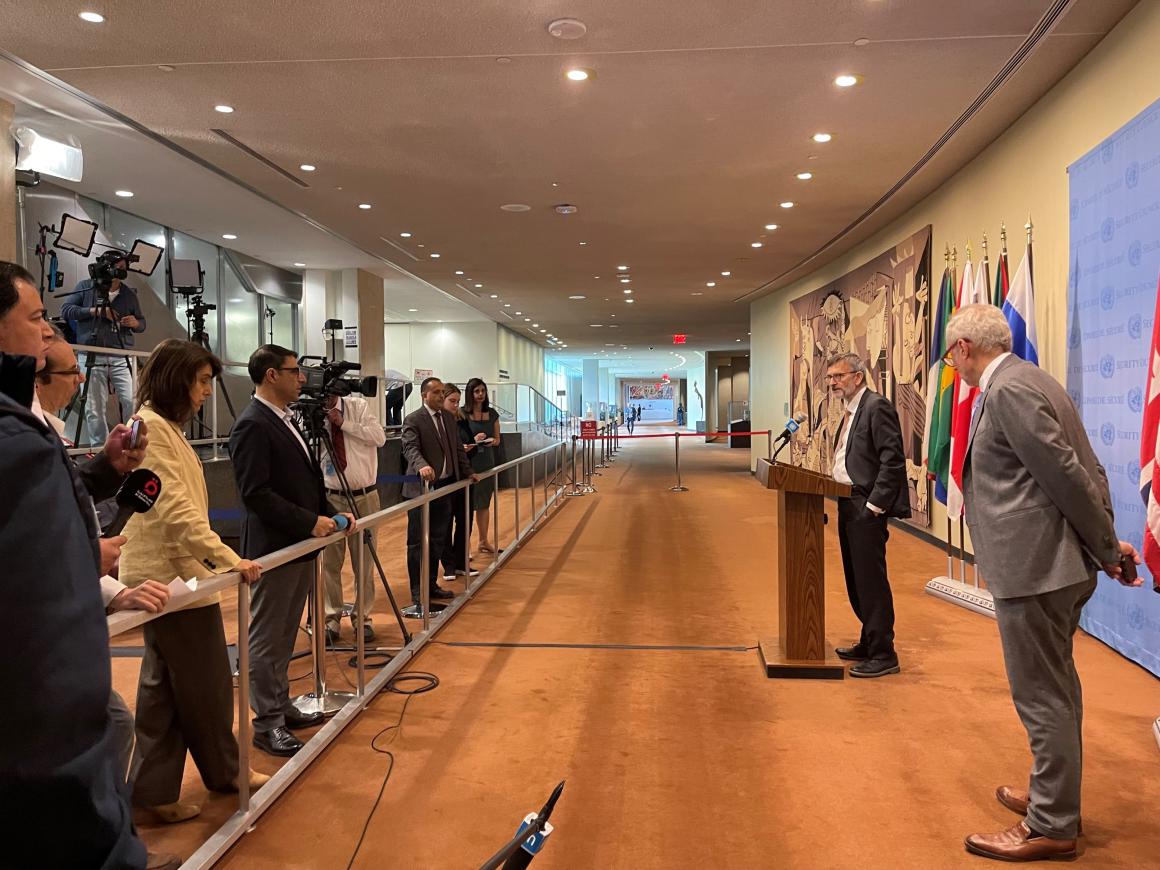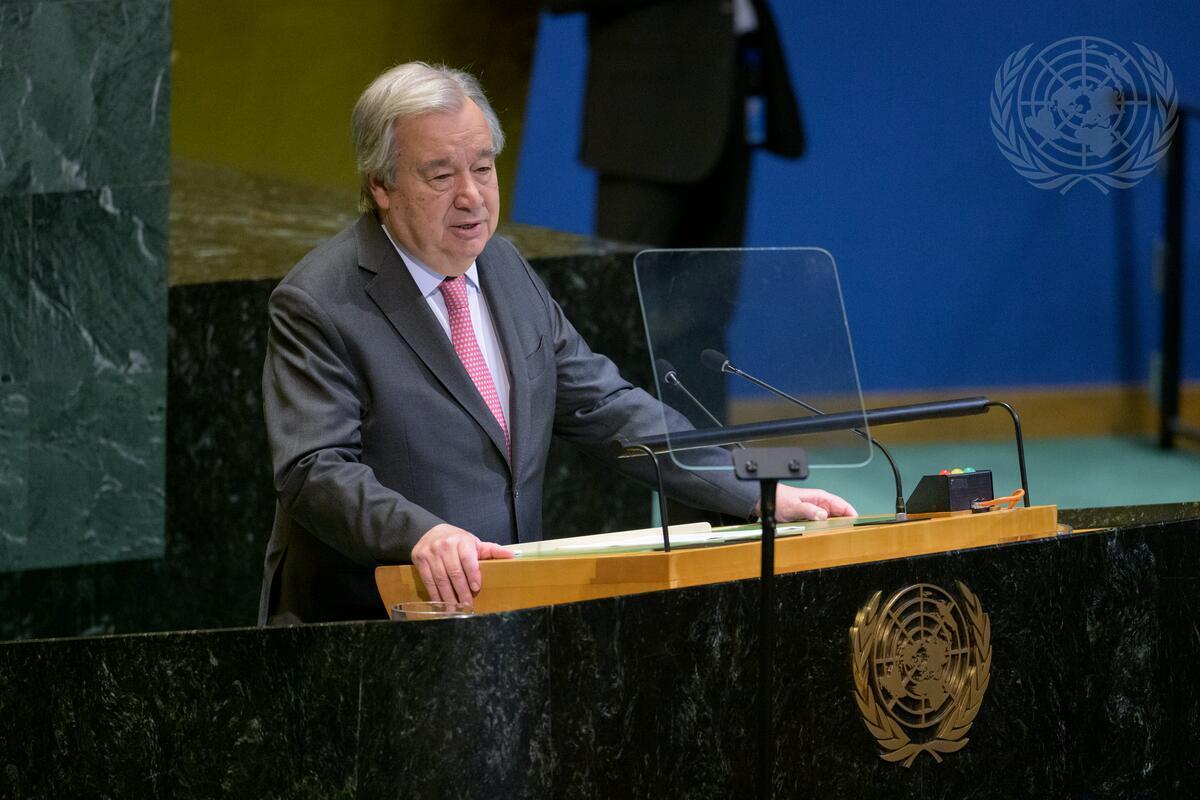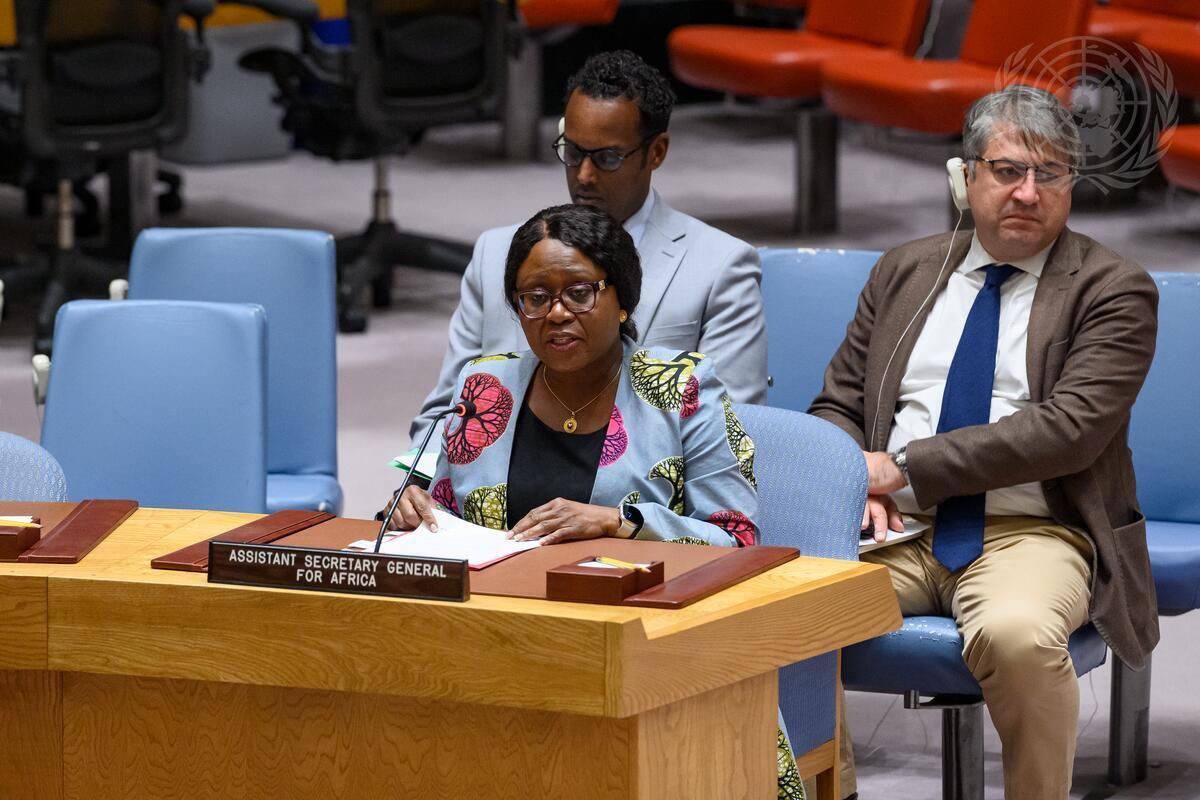The following is a near-verbatim transcript of SRSG Volker Perthes Stakeout that took place on Monday 22 May 2023 at the UN Headquarters in New York. I was moderated by Stéphane Dujarric, Spokesperson for the Secretary-General.
You can also watch the Stakeout by clicking on this link:
https://media.un.org/en/asset/k1y/k1ymhktybe
-SRSG Volker Perthes: I will say a few words and answer all the questions already, so we don't get too many afterwards.
So, three, three points perhaps, which I would like to make.
So, one is, you know, two days ago a ceasefire agreement, an agreement for short-term ceasefire and humanitarian arrangements was signed in Jeddah, Saudi Arabia, thanks to the mediation of the kingdom of Saudi Arabia and the United States. What I want to say from here is this ceasefire really needs to be honored. More than one month has passed since the fighting broke out. We didn't have one day without fighting despite different ceasefires that were unilateral declared by both sides. But this is the first ceasefire where an agreement has actually been signed by both sides. So, they need to honor it. It is good that a monitoring mechanism has been established, which will make it possible to say and if need be, also, say publicly where and when and by whom the ceasefire was violated, if it is violated.
We are expecting the ceasefire to take effect at 9:45 Khartoum time. Both parties had committed not to seek military advantage in the 48 hours preceding it. That has not been honored. We have seen fighting also yesterday and today.
Second point, we need international and regional coordination about the next steps. A ceasefire in particular, a short-term ceasefire is not the goal. It is an instrument to go forward. We will need talks about a permanent cessation of hostilities, and we will need to consider and of course, support a new political process. This will have to be, that goes without saying a Sudanese political process, Sudanese owned, and Sudanese led, but UNITAMS together with our partners in the African Union and IGAD stand ready to support such a process, and we have heard from both sides of the conflict that there is a wish for this to happen.
So there is a lot of well-meaning international and regional actors who want to support a process that leads to an end of the war. My pledge is that everybody who can help should help, that the regional international actors need to come together to coordinate their approaches and avoid anything that would look like competition. I do think the extended mechanism of the African Union provides a forum where everybody who can support is in, and therefore after a few days in between, I will go to others in order to coordinate with my colleagues from the African Union and IGAD.
And the third point is the tall of this war on the civilian population in Sudan has been very, very heavy. Less than 20% of the hospitals are still working. Civilian infrastructure, like water and electricity plants have been damaged. And of course, more than 800 civilians have lost their lives. Many more were injured and probably more than 200,000 now left the country to neighboring countries.
We do need humanitarian aid for the Sudan. We need it immediately, and we need it generously. So the United Nations have come out with a new humanitarian response plan. We are asking for $2.6 billion to support the population in Sudan. We calculate -that's the agency's funds and programs on the humanitarian side- we calculate that the number of people in need will have risen from 15 million that was before the war to 18 million, and they need to be supported.
And at the same time, UNHCR has come out with a refugee response plan because we need to support in the countries in the neighborhood who so generously have been helping Sudanese when they cross the border. I mentioned particularly countries like Chad and South Sudan, but also all the other neighboring countries, Egypt, Ethiopia, Central African Republic they have all welcomed, they have all welcomed people who wanted to leave the country in order to, to escape the violence and they need support. Now, Chad is, is particularly important here because 60,000 people have been leaving Darfur basically to Chad, but also Chad could be an entry point for support into Darfur.
Let me end here and maybe take three questions or so. Thank you.
-Question: Good to see you here, Mr. Perthes. We see in the ceasefire agreement that the UN is not part of the monitoring mechanism. Do you think that the UN should be part of this mechanism? And what do you need to be able to be part of it? Because the Council will possibly extend your mandate in a week from now. Thank you.
-SRSG Volker Perthes: We have provided expertise and ideas to the mediators in Jeddah, and we stand ready to support a monitoring mechanism for a longer term or permanent ceasefire with the staff and the structures and the expertise we have gathered by chairing the permanent ceasefire committee in Darfur, which by the way is still working. So, we have people there not on the ground today, but in neighboring countries who are still running ceasefire committees between as it was the government on one side and the armed struggle group signatories to the Juba Peace Agreements. So, there are that structures established, and we stand ready to support. Now this is a seven-day ceasefire. We hope it will be renewed for a longer ceasefire, you probably also need more elaborated structures and I'm sure that the United Nations will play its role here.
-Stephane Dujarric: Kristen.
-Question: Hi. Thank you. Kristen Salmi from Al Jazeera. Can you comment on who it is that is occupying hospitals and civilian structures in Sudan and also on reports of sexual violence? I know you referred to it in the council in your view is what's happening there in terms of sexual violence, a war crime?

-SRSG Volker Perthes: I will not comment on who's done it or who is in the hospitals. We condemn any aggression against medical facilities, hospitals, clinics, and others. We are very clear that hospitals shouldn't be bombed, that hospitals shouldn't be taken as shelter for fighters. And we have made that clear to the parties in the conflict. And as regards to rape and other forms of sexual violence, we condemn the acts. We don't have the means to establish who is responsible. We can sometimes say in whose area of control it happened, but this doesn't mean that we could point the finger to one side or other. It's more important here to tell all parties that if they commit to respecting international humanitarian law as they have done in the Jeddah agreement, and again now in the ceasefire agreement, they have to make clear that this is not only a commitment by the leaderships, but that what they have committed to is actually conveyed to their rank and file.
-Kristin: Why not they are taking the hospitals? Why not [inaudible] the hospitals?
-SRSG Volker Perthes: Well, if we changed positions, I would work as a journalist and you as an SRSG you would answer that question yourself.
-Stephane Dujarric: Kristen. Oh, sorry, Margret, sorry.
- Question: We're Interchangeable. Mr. Perthes, Margaret Basheer with Voice of America. In your briefing you said that the fighting shows no signs of slowing down, but yet in a couple of hours the ceasefire will hopefully go into effect. So, are you any more confident in the parties this time because it was a negotiated ceasefire than you were in the previous ceasefires that didn't succeed?
-SRSG Volker Perthes: Well, the problem again, is not my confidence in any party. It is that the parties have no confidence in one another and don't trust one another. And it is also not whether I believe that a ceasefire would be honored. It is that we have to work for it to be honored and we have to work with the parties who are leading that war. I do think that both parties over the last five weeks have learned that they will not achieve an easy military victory. That even if they were to achieve a victory over the other side after long struggle, that could be at the expense of losing the country and that there is no alternative if they want to preserve their country, then seizing the fire and going back to some form of political process.
-Question: Thank you. What's the UN's role in the talks between the Sudanese parties in Jedda? Was there any kind of engagement? If not, why?
-SRSG Volker Perthes: Was there an engagement by the US?
-Question: By the UN.
-SRSG Volker Perthes: I think I, I answered that. We have been in contact with the, with the mediators as well as with the parties who were in Jeddah, and we have contributed expertise, but we were not on the ground. We're not involved in Jeddah. UN OCHA, our humanitarian coordinators, have also contributed expertise on what is needed for a humanitarian ceasefire. What's your obligations of the parties are there, and their inputs have been considered in the agreement that has been signed.
-Stephan Dujarric: Eddie’s question then we have to go?
-Question: Thank you very much Mr. Perthes. Edith Lederer from the Associated Press. You said in your briefing that there is growing concern about the ethnic dimension to the conflict expanding both in Sudan and in the region. Could you elaborate on how worrying this is and where is the escalation going at the moment?
-SRSG Volker Perthes: Well, before people quote you and say that it was me saying that no, I did not speak about an ethnicization of the regional dimension. I did speak about the risk indeed of the conflict getting tribal, ethnic or ideological undertones or dimensions inside Sudan. Let me be very clear here. This struggle, this war is not a civil war. It is a war between two military formations, between two armies, Sudanese Armed Forces and the Rapid Support Forces, but not a civil war. But once, and I would see this risk if the ceasefire is not honored and if we don't get to a permanent cessation of violence. If this struggle would continue and we would see mobilization on ethnic tribal ideological grounds, then it could indeed transform into a wider war. And that needs to be prevented. And I know that leaders of both sides are aware of that and do see this risk.
Still we have seen, and I've spoken about the situation in El Geneina, that in the shadow of that war between the two armies and the absence of these security forces as security providers, inter-communal tensions that have been there before have actually exploded and led to large scale violence, particularly in West Darfur and in Geneina and security forces should be there to provide security to the people and that's the demand of the people in Darfur. They may have their opinions of the army and politics or the RSF and politics, but they have all been saying to us over, over the last year and a half, we want the security forces there to provide security. Now, with a war like that, both parties have become providers of insecurity rather than of security. And I think there is a, a strong demand on the part of the people that security forces come back and provide security and that they can also contain communal or intercommunal tensions, which have been there and are often compounded by right now, for example, lack of water in Geneina, which again is a result of fighting and people not having access or, or water installations being damaged, et cetera. Thank you very much. Thank you very much. Thank you.






